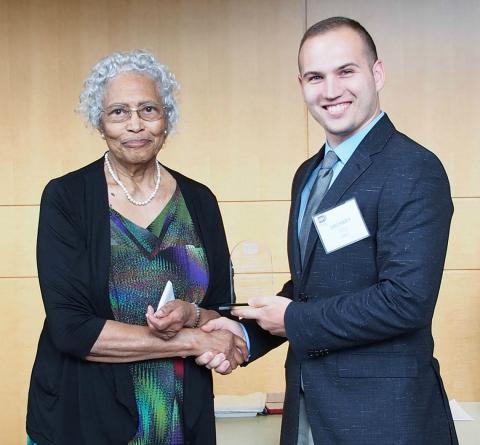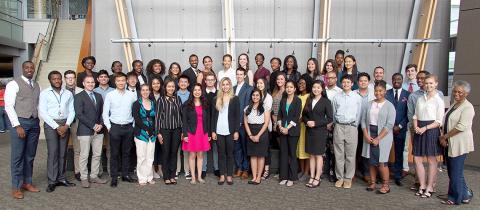NIA’s Summer Student Poster Day Celebrates 25 Years

Photo: Thomas Wynn
Student scientists from across the United States showcased their work recently at the 25th annual National Institute on Aging Summer Program Poster Day. The special event featured work from summer interns from NIA and the National Institute on Drug Abuse, which both house intramural labs at the Biomedical Research Center in Baltimore.
It was 25 years ago that Dr. Barbara A. Hughes, former director of NIA’s Office of Minority Recruitment and Human Relations, organized the first poster session with just 5 students. This year, Hughes was on hand to see posters presented by 46 of the 53 summer students. She was joined by some 40 program alumni who came back to Baltimore for the anniversary.
Overall, some 1,200 students have participated in the program over the years.
Hughes, today’s Summer Program leadership and alumni have seen how the program can help change lives.
“Young researchers need a place that they find motivating and where they can do meaningful work,” said Hughes. “The NIA Summer Program allows students to explore, discover new methodology and it levels the playing field regardless of what high school or college one may have attended.”
The high school, college and post-graduate students do research in one of three areas—neuroscience, aging biology and translational gerontology. They work alongside researchers, from lab chiefs to fellows, who work in disciplines that range from basic science to clinical research and epidemiology. This year, for example, students looked at age-related changes in physiology and the ability to adapt to environmental stress as it affects age-related disease.
The 8- to 10-week summer internship program culminates in students’ presentation of posters to NIH scientists on a wide range of research topics. NIH investigators, administrators and other trainees judge which presentations are the best.

“Poster Day itself seeks to provide students the opportunity to present their work to NIA scientists,” said Arlene Jackson, an intramural recruitment specialist who facilitates the summer program with help from Taya Dunn-Johnson, a program assistant in the Office of the Scientific Director.
This year’s interns said the program helped them hone their interests and map out their future careers.
Davis Truong, a senior at the University of Maryland, talked about the camaraderie and spirit of collaboration he experienced. When he started his internship with the Laboratory of Clinical Investigation, he wasn’t sure what he wanted to study. His mentor, Dr. Ruin Moaddel, helped him figure that out. Truong presented a poster on the NAD metabolome, which indicates how a cell or tissue performs processes that show the state of nutrition, health and disease.
Kaysi Gray, a senior at Howard University, spent the summer in the Laboratory of Clinical Investigation and presented a poster on how different modes of growth hormone administration influence human physiology.
“The program opened my eyes to what opportunities are out there,” she said. Always interested in medical school, Gray is now also considering a post-baccalaureate program or a master’s degree in public health.
Outstanding posters were selected for the Barbara A. Hughes Award of Excellence, which established a competition among students aimed at further engaging them and NIA scientific faculty in the pursuit of high-quality research.
Presentations by an alumni panel and speaker highlighted a discussion about possible career paths for the current interns.
“We can see the impact of the program, evidenced by the engagement of so many alumni,” said Dr. Michele Evans, deputy scientific director and intramural training director, who leads the Summer Program. “By being here and sharing what they have experienced, they give testimony to how their internships not only afforded them an opportunity to work with extraordinary scientists, but [also] how those interactions helped them build confidence toward careers in research.”
An alumnus of the 2002 summer class, Dr. K. Torian Easterling, was this year’s alumni speaker, focusing on “A Commitment to Advancing Health Equity at the Neighborhood Level.” Easterling is a community-based physician and assistant commissioner of the Brooklyn Neighborhood Health Action Centers, Center for Health Equity, at the New York City department of health and mental hygiene, which promotes health equity in low-income communities of color in New York. His advice for summer interns? “Stay true to what your passion and your mission is. This program can help get you to that point.”
Looking to next summer, the program will start accepting applications for summer 2018 from mid-November of this year to Mar. 1, 2018. Although many of the NIA summer interns are interested in gerontology and geriatrics, the program is open to any student interested in biomedical research.
